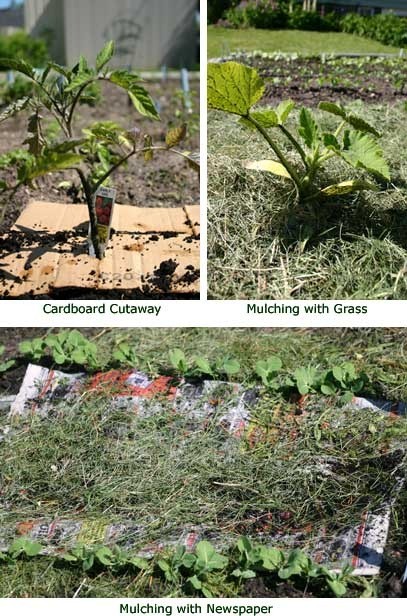
A garden filled with weeds will yield about half as much as a weed-free garden of the same size. In fact, one of the most common causes of a failed garden is letting weeds get the jump on your plants. Organic gardening doesn't attempt to eradicate weeds, just control (manage) them. Here are some guidelines to make sure you retain the upper hand.
Like plants, weeds come in annual, biennial, and perennial varieties. To control them effectively, you need to be able to identify them visually and understand their life cycles.
Annual weeds (e.g. pigweed, lamb's quarters, and ragweed) are best pulled out or cut off at the surface before they flower and set seed. They won't re-sprout, so let their roots decompose in the soil.
Biennial weeds (e.g. common burdock, mullein, Queen Ann's lace) can be effectively controlled by cutting off their flower stalks or by digging them out in their entirety.
Perennial Weeds (e.g. bindweed, Canada thistle, dock, quack grass) are the toughest to control once established. They can reproduce by roots, bulbs, runners, or seed. Pre-sprout them by digging out as many as possible and letting the soil rest a week or two until new sprouts appear. Dig those out and then plant. Don't try to kill weeds by tilling them under or chopping them into tiny bits-you'll only find them sprouting all over!
You can't stop wind from blowing weed seeds into your garden or birds from dropping them from overhead. Nevertheless, you can employ a number of tools to keep them to a minimum.
Prepare your soil for planting, water it well and cover it with dark plastic. After four weeks, the sun's heat (as hot as 160ºF) will have killed any weed seeds and harmful microorganisms residing in the top few inches of the soil. Let the soil dry before planting and avoid disturbing it to prevent deeper lying seeds from reaching the top.
Weeds can be imported to your garden from the soil of plants received as gifts, a rotten veggie tossed off to the side or as part of compost or fertilizer (especially horse manure). Before adding compost, mulch or new soil to your garden, pot some to test it for weed sprouts.
This is great for smaller gardens. Prepare soil for planting, water it thoroughly and cover it with dark plastic. Make small slits in the plastic to plant your seeds. The plastic will keep weeds from sprouting, though it may be more difficult to add compost or soil amendments later if necessary.
Spacing plants correctly allows crops to naturally shade the soil and prevents weeds from sprouting. The leaf tips of mature plants will just touch each other if spaced appropriately.
Once your plants are a few inches tall, weed thoroughly then mulch. Weed control is just one of the many benefits of mulching; it holds in moisture, adds nutrients to the soil, improves soil structure, prevents soil-borne diseases, encourages worms, prevents run-off, and keeps flowers and veggies clean!

Pulling weeds by hand is still one of the most effective methods of weed control. Try to remove weeds before they set seed. Moist soil makes them easier to remove. If the tops are seedy or you're unsure of the weeds lifecycle (annual, perennial, etc.) don't compost them, bury them away from your garden.
Underground and drip irrigation systems deliver water only to the plants you're trying to cultivate. This minimizes the amount of moisture water-competing weeds have access to.
Planting cover crops (grains, clovers, or legumes) over the winter will protect your soil from erosion, enrich it with nutrients and inhibit weed growth all at the same time. Cover crops planted during the growing season act as mulch around fruit trees, shrubs, and perennial vegetables. Consult with your local extension agent or garden supply store to find out what types of cover crops work best for your climate and soil.
Soap and vinegar based herbicides are available commercially, but read the labels carefully because many are not safe for food gardens. These herbicides are usually non-selective and can damage both crops and weeds if used incorrectly.
About The Author: Ellen Brown is an environmental writer and photographer and the owner of Sustainable Media, an environmental media company that specializes in helping businesses and organizations promote eco-friendly products and services. Contact her on the web at http://www.sustainable-media.com
Add your voice! Click below to comment. ThriftyFun is powered by your wisdom!
I am really grateful for the tips on this site. I have a boulevard full of weeds and grass that the city is responsible for, but isn't looking after. The weeds on it are blowing their seeds into my garden so I am going to try boiling water and then vinegar/salt solutions after that. Thanks!
I learned a lot from this web site. I had a pool put in last summer and could use some help about landscaping around the pool. Any help you could give me.
Add your voice! Click below to comment. ThriftyFun is powered by your wisdom!